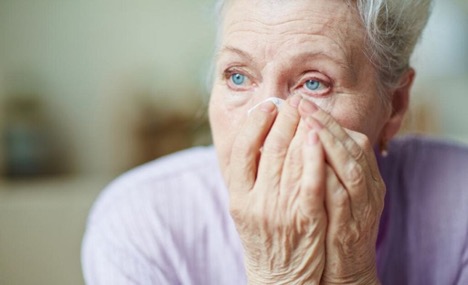Unwanted loneliness can leave us without hope. Those on the psychotic spectrum are even more susceptible to experiencing it. In fact,f or these individuals, its effects can be heartbreaking.
Loneliness usually signifies isolation. It’s like a cruel pair of scissors that cuts the threads that connect us with other people, depriving us of everything that a solid circle of support around us can provide.
“Imposed solitude is the prison of the mind.”
-Stephen King-
Unwanted solitude
Gabriel García Márquez said that “solitude, when unwanted, poisons the heart.” This could well be true. Indeed, loneliness is a public health problem in a good part of the planet, especially in the more developed countries. Moreover, despite its seriousness, it’s often ignored.
Indeed, the effects of loneliness on the body and mind are disastrous (Luo et al., 2012). For Instance, sufferers are more likely to suffer from depression, die prematurely, or develop symptoms on the psychotic spectrum.
As we mentioned earlier, individuals with psychotic disorders experience loneliness more severely. This is because they often exhibit impoverished social structures because their social networks are ephemeral and scarce or even non-existent.
In fact, this is the bleak landscape that those on the psychotic spectrum (at least one percent of the world’s population) face on a daily basis. Evidence suggests that eight out of ten patients report this emotion (Lim et al., 2017). It’s a suffocating and desolate experience.
“Unwanted loneliness is an endless desert.”
-Pearl S. Buck-
Social defeat
The social defeat hypothesis posits that social difficulties are a risk factor for psychotic spectrum disorders (Hawkley et al., 2010). Experts have also found associations between this emotion and the following elements (Lim et al., 2018):
- Paranoia.
- Negative symptoms.
- Negative beliefs about the world.
“Loneliness is the loudest cry anyone can hear.”
-August Strindberg-
In this particular context, feeling lonely is often related to positive symptoms. These are hallucinations and delusions. In addition, social media contacts (mainly family and friends) of these people have been studied. The results are quite sad.
It seems that individuals with psychosis who habitually and savagely experience loneliness, are likely to have friends who are also lonely. This suggests that loneliness is a ‘sticky’ emotion that attracts, like a magnet, other people who are its captives.
According to induction theory, loneliness acts as a ‘black hole’ that influences the level of loneliness of the individuals with whom the sufferer interacts, feeding back this emotion and increasing it (Cacciopo et al., 2009).
“Loneliness has been linked to the development of psychotic experiences.”
-Anson KC Chau-
The impact of loneliness on the psychotic spectrum
In the psychotic context, the consequences of this devastating emotion are reproduced exponentially. In fact, there are many studies that investigate this link. Today, we’re going to focus on a study conducted by Dr. Michelle H. Lim (2018). She states that:
- Loneliness is closely related to auditory hallucinations.
- It produces stigma. Patients report feeling less socially supported. Thus, they’re often perceived as incompetent.
- They feel extremely dissatisfied with life. This is due to the fact that they’re suffering psychotic symptoms as well as the hopelessness of loneliness.
- They frequently attend the hospital. Indeed, if they have little or no social network, they might think that the only thing left for them is to be cared for by health professionals.
- Loneliness multiplies the risk of suffering from a cocktail of clinical entities. For instance, depression and suicidal behaviors.
- When they perceive and know that they have support and extensive networks of friends, their levels of well-being increase. Therefore, it’d be interesting if interventions were focused on promoting their social universe.
- As long as sufferers continue to experience high levels of loneliness, they’re unlikely to get better. Recovery is linked to large support networks. They have the potential to lessen the perception of loneliness.
“Unsought loneliness is the greatest of all cruelties.”
-Ellen Glasgow-

Loneliness, anxiety, and the psychotic spectrum
In addition to the aforementioned depressive symptoms, there are more links. As a matter of fact, loneliness could be the vehicle that leads the sufferer of psychosis to experience high levels of anxiety. In turn, this is linked to paranoid delusions.
As we mentioned earlier, the effects of loneliness can be heartbreaking. They can even be so in individuals who aren’t on the spectrum. However, its pernicious effect multiplies rapidly in those who are.
From society’s perspective, we must review the stigma given to sufferers. Mental health professionals can help them via interventions that promote the generation of broad, rich, and functional social networks. These can put the brakes on and stop the sufferer’s loneliness from intensifying and tormenting them.
“Loneliness is the cruelest company when you don’t want it.”
-Lord Byron-
The post The Link Between Loneliness and the Psychotic Spectrum appeared first on Exploring your mind.



















Comments